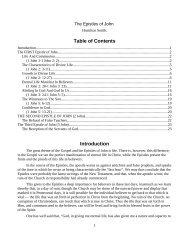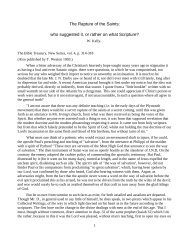An Exposition of Revelation .pdf
An Exposition of Revelation .pdf
An Exposition of Revelation .pdf
Create successful ePaper yourself
Turn your PDF publications into a flip-book with our unique Google optimized e-Paper software.
shall rule them with iron rod, as the vessels <strong>of</strong> the potter are broken to shivers; as I also received <strong>of</strong> my<br />
Father. He that hath an ear, let him hear what the Spirit saith to the churches." The faithful will share<br />
Christ's authority at His coming, and be associated with Himself in His kingdom. But even this is not<br />
enough for grace. "<strong>An</strong>d I will give him the morning star." This means, not association with Christ in<br />
His reign over the earth, but yet more in that which is proper to Him above the world altogether. The<br />
heavenly hope <strong>of</strong> being with Christ before the day breaks is promised, as well as part in His worldkingdom.<br />
Only those who watch for Him shall see the Morning Star. All the world must see the Sun <strong>of</strong><br />
righteousness when He shines forth in His day.<br />
Here the notable change takes place. The call to hear begins to follow the promise, instead <strong>of</strong><br />
being before it. The reason is that a remnant is here formed. The public state <strong>of</strong> the church now<br />
requires the change. The Lord thenceforth puts the promise first, and this because it is vain to expect<br />
the church as a whole to receive it. The address is to the overcomer, who is therefore put before the<br />
call to hear. In the three previous churches, as all may notice, the call to hear is first, because the Lord<br />
is still dealing with the general conscience <strong>of</strong> the church. This is given up now. A remnant only<br />
overcome, and the promise is for them. The Lord henceforth takes notice <strong>of</strong> these in His call; as for<br />
others, it is all over with their fidelity.<br />
Accordingly, if Thyatira were not made the beginning, as perhaps in strictness might have been<br />
best, the division <strong>of</strong> the next chapter (3) seems not to be unhappy at this point. For there is a marked<br />
turning-point with the last three churches. The ground <strong>of</strong> such a thought lies in the fact that the<br />
introduction to Sardis indicates the Lord beginning a new state <strong>of</strong> things. The ancient ecclesiastical or<br />
catholic phase <strong>of</strong> the church terminates with Thyatira: nevertheless Thyatira has also the peculiar trait<br />
that, though the close <strong>of</strong> the public state <strong>of</strong> the church, it is the beginning <strong>of</strong> those conditions which go<br />
on till the Lord's coming. It is therefore transitional. Thyatira, it is hard to doubt, contains within it the<br />
mystic representative <strong>of</strong> Romanism. This can scarce be denied to Jezebel; whilst "the remnant"<br />
represents those who, without being Protestants, form a witnessing company apart from Popery before<br />
the Reformation. The beginning <strong>of</strong> the third chapter introduces formally what may be called the<br />
Protestant phase <strong>of</strong> things, after the film stand for God's word.<br />
Thus we have had the general condition <strong>of</strong> declension; next the early persecution from the<br />
heathen; then the power <strong>of</strong> the world patronising the church; finally, besides the remnant which in<br />
simplicity resisted the evil, we have Romanism, which alone, by the mention <strong>of</strong> Christ's personal<br />
coming, is supposed to go on to the end. The churches before do not continue. But Thyatira first<br />
represents that which abides. This applies also to the churches which follow.<br />
<strong>Revelation</strong> 3<br />
"<strong>An</strong>d to the angel <strong>of</strong> the church in Sardis write: These things saith he that hath the seven Spirits<br />
<strong>of</strong> God, and the seven stars." There is an evident allusion to the manner in which the Lord presented<br />
Himself to the church in Ephesus, but with a marked difference. Ephesus was the first presentation <strong>of</strong><br />
the general public state. Sardis gives the rise <strong>of</strong> the new state <strong>of</strong> things, not strictly ecclesiastical —<br />
the Lord acting in the way <strong>of</strong> testimony rather than in that precise order. Hence it is not said here that<br />
He held in His right hand the seven stars and walked in the midst <strong>of</strong> the seven golden lampstands: this<br />
was ecclesiastical strictly. But here He "has" the seven Spirits <strong>of</strong> God and the seven stars. He changes<br />
not, but does not describe Himself as before. Yet all power, all governing energy, is in His hands, and<br />
the seven stars, that is to say, all the instrumental lights by which He acts on souls here below. Let<br />
them not look to the world — to the powers that be. "I know thy works, that thou hast a name that<br />
20






